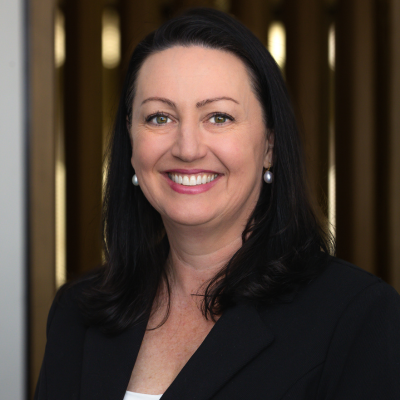 Kylie De Courteney
Kylie De Courteney
Managing Director
NSW Telco Authority
- Chronicling the rapid evolution of generative AI technology to identify emerging opportunities and areas for investment
- Assessing how changes in generative AI's influence on business models and operations could impact the APS
- Projecting future generative AI disruptions to prepare for the next waves of change
 Dr Michael Kollo
Dr Michael Kollo
Chief Executive Officer
Evolved AI
 Jennifer Mulveny
Jennifer Mulveny
Director, Government Relations, Asia-Pacific
Adobe
- Leveraging conversational interfaces to make data exploration more intuitive and dynamic by allowing users to interact with data through natural language queries
- Maximising the potential of conversational AI interfaces to respond to an ongoing array of user queries with customised data narratives
- Utilising conversational AI to significantly reduce traditional cultural and financial costs
 Andrew Spiegelman
Andrew Spiegelman
Head of Data & Analytics
Service NSW
- How will the evolution of generative AI impact the public sector in the next 6-12 months?
- What areas are the ripest for transformation and how can the government capitalise on the opportunities?
- What strategic shifts does government need to make to integrate advanced generative AI technologies more fully?
- What ethical considerations should be prioritised to ensure responsible AI use?
Moderator:
 Distinguished Professor Fang Chen
Distinguished Professor Fang Chen
Executive Director – UTS Data Science Institute
UTS
Panellists:
 Andreas Bleich
Andreas Bleich
Assistant Secretary – Data, Systems and Information Management
Department of Infrastructure, Transport, Regional Development, Communications and the Arts
 Mark Higgs
Mark Higgs
Executive Director – Digital Channels
NSW Department of Customer Service
 Rebecca Ostergaard
Rebecca Ostergaard
Chief Digital Officer
CSIRO
 Dan Bridgman
Dan Bridgman
Senior Manager Data Science
Transport for NSW
- Mitigating potential deployment risks by identifying and addressing exposure areas when it comes to generative AI in government
- Learning strategies to ensure compliance with regulatory frameworks while enhancing existing security protocols
- Managing AI deployment risks through effective governance frameworks
- Utilising continuous monitoring to ensure the responsible and secure use of AI in public sector operations
 Bill Simpson-Young
Bill Simpson-Young
Chief Executive Officer
The Gradient Institute
- Transformation and potential of Generative AI
- How to use technology in a safe and responsible way
- Role of the Australian public sector in being an exemplar
 Anthony Murfett
Anthony Murfett
Head of Division – Technology and Digital
Department of Industry, Science and Resources
The generative AI showcase features rapid-fire 10-minute sessions where AI experts and solutions providers will present emerging technologies that offer a glimpse into the future of AI in government.
Generative AI and Its Transformative Potential in the Power Platform
 Luca Caruso
Luca Caruso
Business Applications (Dynamics 365) Practice Manager
SOCO
These showcases are reserved for subject matter experts. If you wish to sponsor one of these sessions, please get in touch with Milad Etemadi at milade@questevents.com.au
- How can government develop effective training programs to enhance employees' ability to understand and critically assess AI outputs?
- What essential elements should be included in a framework for critically examining AI-generated information and existing decision-making processes?
- How can secondary checks and cross-referencing with human expertise be systematically integrated into departmental workflow to ensure accuracy and fairness?
- How can ethical considerations be embedded into the routine evaluation of AI outputs to maintain public trust and accountability?
Moderator:
 Professor Allison Kealy
Professor Allison Kealy
Director of the Innovative Planet Research Institute
Swinburne University of Technology
Panellists:
 Michael Smedes
Michael Smedes
General Manager & Chief Information Officer
Australian Bureau of Statistics (ABS)
 Olga Lysenko
Olga Lysenko
Director - Enterprise Data Strategy, Governance and Management
Department of Climate Change, Energy, the Environment and Water
 Bianca Jordaan
Bianca Jordaan
Chief Digital and Information Officer
Department of Planning, Housing and Infrastructure
- Highlighting the importance of using approved and secure AI tools to reduce risk exposure when processing sensitive, personal, or classified data
- Exploring the systems and protocols that need to be in place to adhere to strict data security guidelines and prevent unauthorised data use
- Enforcing compliance to ensure integrity in handling restricted data types
 Zafar Issadeen
Zafar Issadeen
Manager – Business Information and Intelligence
Level Crossing Removal Project
- What are the critical steps in conducting comprehensive risk assessments before deploying AI tools?
- How can control measures, such as data encryption and establishing security protocols, be effectively implemented to enhance data security in AI applications?
- Can regular security audits and continuous monitoring help to mitigate emerging risks within AI tools and data vulnerability?
- What are some of the most significant challenges and opportunities in managing the risks associated with AI implementation?
Moderator:
 Kylie De Courteney
Kylie De Courteney
Managing Director
NSW Telco Authority
Panellists:
 Paul White
Paul White
Chief Information Officer
Port Macquarie Hastings Council
 Nattlie Smith
Nattlie Smith
Branch Manager - Strategic Insights Branch
National Indigenous Australians Agency
 Marc Pelusi
Marc Pelusi
A/Director Service Delivery, End User Computing, Web and Application Development
Sydney Local Health District
 Leanne Siveyer
Leanne Siveyer
Chief Information Officer
Sutherland Shire Council
 Jules Zanetti
Jules Zanetti
Cyber Security Manager
SOCO

